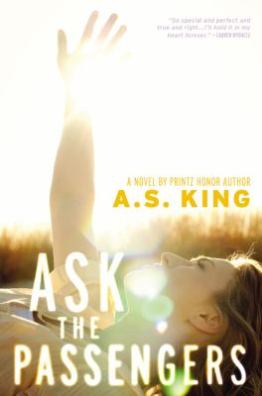Ask the Passengers by A. S. King 
Astrid Jones isn’t sure that her love is acceptable to anyone. She has a lot of it to give, but to whom? While she’s deciding—and deciding takes many months—she spends her odd free moments lying on a picnic table in the backyard, throwing her love up in the air, toward passengers on the airplanes that fly by.
These passengers appear to be able to feel Astrid’s love and respond to it—they all have problems with loving others and being loved. Just as Astrid does. Her mom is a stereotypical self-involved businesswoman who appears only to love Astrid’s sister. Her dad copes with his overbearing wife by staying stoned pretty much all the time. Her sister worries about being on the hockey team and the small town gossip about girl athletes being lesbians.
The small town narrow-mindedness of Unity Valley is getting to the whole family. You feel that in another environment they would be all right. But having to tough it out is worse for Astrid than the others. She thinks she may be gay. She feels that she’s in love with Dee, a girl who is out of the closet and very interested in Astrid. They both work for a caterer and sometimes find chances to kiss one another in the commercial refrigerator. But Astrid doesn’t want Dee to press her to do more. She doesn’t want to be forced to come out. She needs to work this out at her own pace.
Because life is so hard, Astrid finds comfort in her humanities class, where she learns about philosophers and their big questions. She images having several conversations with Socrates, studies paradoxes and looks forward to the day at school when the humanities students will dress in togas and pose paradoxes to the students at large. (This sounds like a great class for students who want to engage in life’s big questions. Oddly, the ‘paradoxes’ that Astrid and others come up with aren’t real paradoxes. This was a bit of a letdown for me, but in general, reviewers didn’t notice, so maybe it isn’t an issue for the reader. It may be enough that big questions are being asked.)
Astrid has friends who are also keeping secrets, also fearful of the small-town reputation-ruining machine. Ultimately, she learns to be brave, to accept herself, and even to accept others who are not as fearless as she becomes.
High school housekeeping: I know that you have seen every YA novel covered with exclamations on how it is the best book the reviewer has ever read. I think reading these blurbs is like seeing a product in the grocery store that screams “New formula!” Well, you’re going to see the ‘best book ever’ blurbs with Ask the Passengers, but don’t be too cynical. This really is a very good novel. It shows how coming into oneself can be a long, difficult process. While there are a few flaws—Astrid’s mom is one-dimensional, and believing that she would totally ignore one daughter while having ‘Mommy and Me’ dates with the other (including getting that daughter drunk each time) was something I couldn’t buy—there’s a great deal to like about this book. There’s value in working through Astrid’s process with her. Though not all teens are questioning their sexuality, Astrid’s way of dealing with big questions in order to find the courage to act on life issues can be a helpful model for the problems that all teens have to face.
